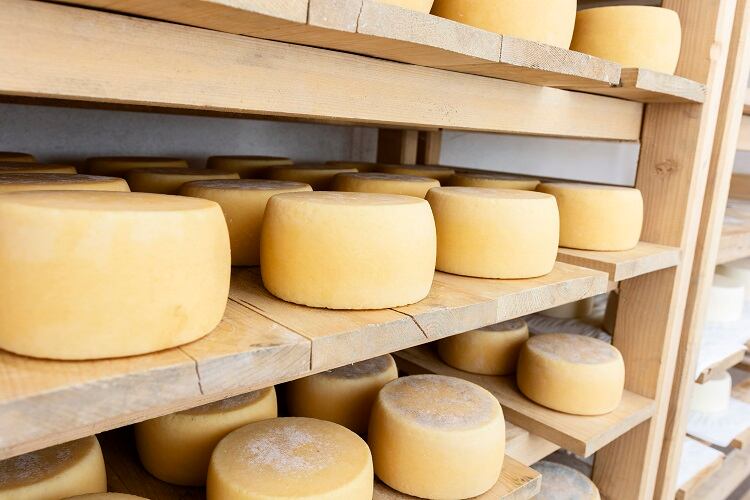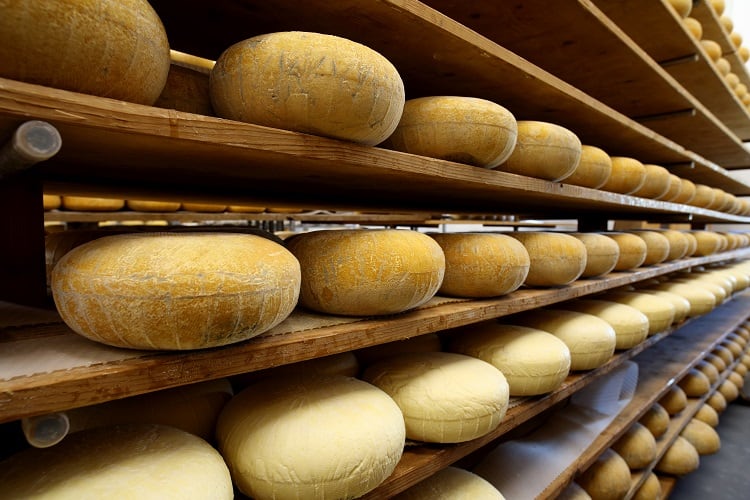Danbo cheese is one of Denmark’s most popular cheeses. A cow’s cheese, it often has caraway seeds added. Under normal conditions, it usually takes around a month to ferment.
But now, researchers from the DTU National Food Institute have found out a way to cut this fermentation time down to just a few days.
Cheese in general usually takes at least a month to ferment, with some cheeses taking up to a year. So, a technique that cuts down this time to just days could be very useful if applied on a wider scale. This would also make cheese production more sustainable, as fermentation requires storing cheese in a very cold room, which consumes a lot of energy.
The cheese-ripening process
“Cheese ripening has been described as the most costly part of cheese manufacturing (if disregarding production of milk),” associate professor Christian Solem, one of the researchers behind the project, told FoodNavigator.
“In order to ripen cheese, you need to keep it in a ripening facility for a long time, which is costly for various reasons. There are inventory costs because you cannot sell your product for months.

“The ripening facility is expensive to keep running (especially these days, with high energy prices), as you need to maintain certain temperatures and the moisture content of the air should also be controlled.”
As well as taking up a lot of time, and consuming a lot of energy, there are other problems with traditional Danbo ripening methods. “There is also the risk of spoilage! Mould growth is always undesired, as these produce various toxins, some of which can cause cancer,” Solem told us. “Faster ripening means less opportunity for moulds to grow (they grow slowly).”
So, as well as improving sustainability, the DTU National Food Institute’s new method could also reduce health risks.
How it works
Danbo cheese is a surface-ripened cheese, meaning that microorganisms ripen the cheese by growing on its surface. They break down proteins whilst growing, giving the cheese a distinctive smell. and secrete various enzymes, which speeds up the ripening process.
Solem and his fellow researchers realised that by stimulating the surface culture of microorganisms in a fermentation tank, they could speed up the process. By creating the optimal conditions for the microorganisms to thrive in the tank, a lot of the growth time from the traditional method could be bypassed.
"We have created a shortcut for faster cheese ripening by cultivating the microorganisms in a fermentation tank under optimal conditions, rather than cultivating them over a longer period on the surface of the cheese," said Solem.
Danbo is sometimes called "King Christian cheese", after 19th and 20th century Danish King Christian IX.
The future of cheese
It’s all very well to use it to help ripen Danbo cheese specifically, but could this new method be used to change the ripening process of cheese in general?
“Yes, the method we announced for Danbo cheese, in principle could be used for other cheese variants,” Solem tells us.
“In the meantime we have demonstrated in large scale at a dairy that we can optimize the cheese culture to significantly reduce ripening time, approximately 50% for a long term ripened cheese.”
However, he tells us that further innovations could apply to a whole range of cheeses. “This we have not announced, and it is something completely new that for sure could be used for any cheese that is manufactured using lactic acid bacteria, for example Cheddar, Gouda and the Danish Danbo.” Lactic acid bacteria (LAB) are bacteria that play a key role in traditional cheese-making. They are incredibly important for producing flavour in cheese.
“This culture, when combined with the accelerated surface ripening approach could greatly reduce cheese ripening."




